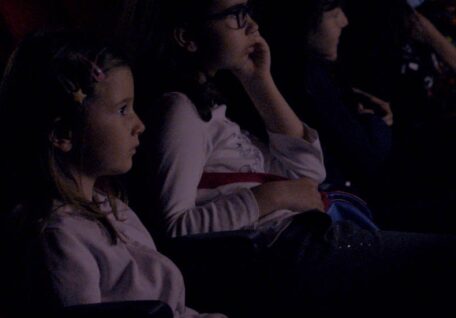Essay
The art of listening
Author: Mia Nikolovska
Listening is a way of understanding the art behind the spoken words, it's not just the act of hearing those words. The art of listening is creating an environment in which the other person feels understood. People don't want you to hear the word, they want you to feel it completely. People want to feel heard, they want to feel seen, they want to feel understood.

How many times has someone told us “Are you listening to me?”. People often think we're not actually listening to them. They think we are probably daydreaming and just nodding our head during the whole conversation. Sometimes we don't listen to what the other person is really saying, we just hear the words that are coming out of their mouth. It's important to learn how to listen with full and undivided attention.
Listening is a way of understanding the art behind the spoken words, it's not just the act of hearing those words. The art of listening is creating an environment in which the other person feels understood. People don't want you to hear the word, they want you to feel it completely. People want to feel heard, they want to feel seen, they want to feel understood.
Everyone should be able to listen, but the majority of individuals find it difficult to do so. Many people are unaware that listening involves more than just hearing sounds; it also entails paying close attention to what others are saying and making an effort to comprehend the point they are making. People frequently claim to be listening when they are only hearing you and not really trying to understand what you are saying. Unfortunately, many people who don't know how to listen believe they can listen well. They believe because they have been listening all of their life they can listen. Listening is not inherited or a personality trait, it is a skill that must be worked on and practiced. Anybody can become a good listener if they are committed to learning how and are willing to work hard.
One of the best ways a person can practice their listening skill ist through watching a movie taking in consideration that the goal of the movie is to make the audience feel as if they have lived the experiences of the character onscreen, and can identify with their struggles through the narratives in the movie. Movie stories don't just happen, creating them is work and it's a result of a whole bunch of decisions made by a screenwriter. One of them is choosing whose perspective is going to be shown in a movie. This is especially important in first-person stories, where everything we watch comes to us directly from the point-of-view of the character. Narration gives us a window into the character's thoughts and the story allows us to peek in on their most private affairs. Even if we cannot directly relate to a character’s circumstances, let's say we’ve never been to war, lived in a dictatorship or are not the same gender or age, we can still connect with them. So long as the story-telling and emotional perspectives are there our ability to feel emotional for fictional characters will transcend all the other circumstantial details. For example in war movies veterans tell us that nobody can know what it’s like to be in a war without actually being there. We ache for the young soldiers who are learning that their families have been killed in the war. These films help us see the war from the point of view of those in it, such as soldiers, civilians, journalists and others. Another example are movies that tell a story about the hard life of some children that live in poverty. These movies may be the closest you can get to seeing daily life from these children's perspective: their human rights being broken, exploitation, the conditions that they live in and much more. The way we respond to fictional characters has a lot to do with our ability to connect with others and to feel for a person’s situation. We’d have a hard time processing a character's behavior if we didn’t have experiences with people in the real world. The experiences with fictional characters resonate with us because of the fact that we’ve had deep experiences with people throughout our lives.
All of this happens because humans can feel empathy. Empathy is a phenomenon we experience almost daily in our dealings with others, and that plays key roles in the way we respond to fictional characters. It allows us to experience another person’s feelings and can then lead to sympathy, or ability to understand that another person is experiencing pain, which often makes us wish to alleviate that pain for them. Sometimes we fill in the details of characters’ lives that are missing just as we do with real-life friends and family, in our minds subconsciously. This may include parts from their past, what they’re thinking or what they were up to when we weren’t around, which only heightens their sense of realness. At the same time, for the duration of the film or story, we may get to know those characters more personally than we know some of the people that we personally know. So long as a director gives proper perspective on a fictional character, allowing us to both imagine their pain and to perceive their experience from a distance we can momentarily let go of the fact that that character exists only in the realm of fiction. In other words, we connect with them on an emotional level, as we would with a friend. As anyone who has watched an engaging film or read an engaging novel knows, we invest ourselves deeply in the experience of living with those characters. We tend to respond to them as though they were real individuals.
Emotions are a vital aspect of the storytelling ability that a movie has and are vital characteristics of the larger human experience. They are a fundamental part of what makes us complex creatures.
The benefits of practicing the art of listening go beyond just comprehending what the other person has to say. Being a good listener can help us understand the situations the others are in without judging them for the decisions that they made, because we lack empathy. A good listener takes the time to see the world from the other person's eyes and feel the things as the person who is talking. So next time you are in a conversation with someone, pay attention to what is important: not just their words, but the way they are telling their story.
About the author:
Mia Nikolovska
Age: 18
Country: North Macedonia
City: Skopje
School: Georgi Dimitrov
Juror in Giffoni Macedonia: 2022

Do you want to be a part of the EPYC Blog?
The EPYC blog is a space where all young people can share their thoughts on topics related to the peacebuilding power of film and arts in general
Use the form to aplly for your EPYC space!
Tell us who you are and what you want to write about.
If your idea is alined with the vision of the EPYC blog, our team will contact you.
The EPYC Blog is curated and edited by Idea Artis.
Chief Editor: Stefan Mitikj
The views and opinions expressed by the posts within The EPYC Blog are those of the authors and do not necessarily reflect the official policy or position of Giffoni Macedonia Youth Film Festival and the EPYC project. Any content provided by our bloggers or authors are of their opinion and are not intended to malign any religion, ethnic group, club, organization, company, individual or idea/opinion.
The EPYC Blog does not participate in any type of affiliation program. Any link to third part content, including adds and promotional contents, is meant for informational purposes only.
